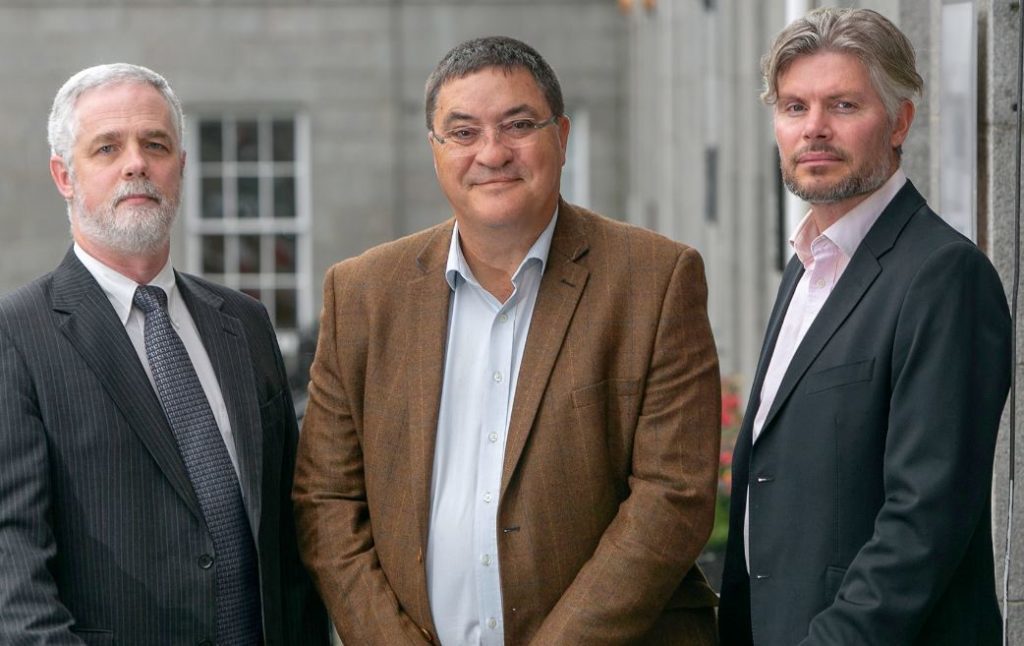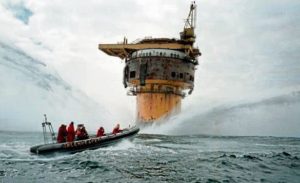
Fledgling service firm Sentinel Subsea has global ambitions for its new tool which monitors abandoned oil and gas wells.
Set up through Elevator’s Grey Matters programme, the Sentinel team has developed a technology which it claims is more effective than remotely-operated vehicle (ROV) checks, typically carried out every two years after abandonment, and pressure gauges to monitor wells which “don’t cover all the bases”.
The new tool works like a “smoke alarm” which detects leaks in wells.
It seals material in the well which can only leak through a breach. When this happens it sends a satellite beacon to the surface which then switches on and alerts the relevant company to the leak.
Sentinel chief executive Neil Gordon said this removes the need for less effective tests.
He said: “The issues with the ROV fly-bys are that they are diverting ROV assets that could be doing something value-added and if the well has lost its integrity, if you’re checking it every two years, then conceivably it could have been leaking for 23 months because it could have just happened after the last fly-by.
“Pressure temperature gauges will tell you if a barrier has failed internally. . . but not whether it has emanated into the environment, plus they need changing and there are battery life issues.
“What we have got is something that will cover all three stages of the well but not add any risk, will permanently monitor the well and does not require battery change-outs, or fly-by with ROVs, so it has the ability to work like a smoke alarm, sat there monitoring the environment and it means that it does not need to be inspected if nothing has changed.
“You don’t lie awake at night sniffing for smoke, you rely on something to tell you something has happened,” he added.
Mr Gordon believes the technology is extremely scalable, with potential to grow in the North Sea, as well as regions around the world such as the Gulf of Mexico.
Since incorporating in April, Sentinel has planned field trials with operators for next year in the UK and plans to hire locally as the firm takes off.
He said: “When you look at the North Sea – the UK, Norway, Holland – there’s a market, but when we look at the Gulf of Mexico there’s a market in terms of magnitude.
“So we’re very exportable, very scalable, although we have ambitions to hire locally and establish ourselves in the north-east of Scotland, which is what the whole Grey Matters project was about – having north-east business that can expand globally.
“We’ve got a business plan together that shows pretty rapid growth. A well is a well. The ambition is to grow a sizeable business and we’ve got a technology roadmap in terms of where we go next.”
Sentinel believes that its system could also save operators money in the long term for decommissioning, as firms with commercial interests in a well will always have liability for any leaks after abandonment.
It will also work as the litmus-test for new well plugging and abandonment techniques offshore.
However, beyond the commercial benefits, the company said there are obvious environmental advantages to the system, which will facilitate swift responses to any well leaks.
The ability to gain public trust and prove that companies are acting responsibly with decommissioning is an important point for Mr Gordon, a lesson he learned from his father.
In 1995 his dad, Jim Gordon, was involved in the decision to sink the Brent Spar platform while working for Shell Europe.
Shell said the episode did damage its reputation, despite getting independent scientific backing for its proposals to sink the storage tanker in deep Atlantic waters.
Mr Gordon believes getting public backing is critical, although agreed with the decision to sink the Brent Spar.
He said: “We all know what happened next; Shell petrol stations got firebombed and there were almost riots outside the Shell offices.
“The man who signed that final approval, to this day, says that in his lifelong career at Shell it is the one decision he regrets the most and it illustrated to him that we as an industry are constantly in danger of living in our own bubble and not seeing outside interests and concerns.
“The reason I know that is because his name is Jim Gordon and he’s my father.”
Prior to the inception of Sentinel Subsea, Neil Gordon thought he had retired.
Having been made redundant amid the recent downturn, which he said had come at the right time for retirement, he was ready to take a step back.
However after a brief period of golfing and fishing, he found himself “bored” and looking for the next challenge.
Despite the opportunity to move back into large oil and gas corporations, he decided to apply for Elevator’s Grey Matters programme.
The business incubator’s scheme is aimed at making sure the oil and gas industry does not lose valuable skills of experienced senior management who have lost work amid the downturn.
It aims to create high growth businesses, set up in the north-east.
The scheme brought Mr Gordon together with members of his current team, and he believes the reason they have been successful in securing field trials in minimal time is largely due to Grey Matters.
He said: “I think that is all because of the way the Grey Matters scheme brought people with ideas and experience together, as opposed to a mid-20s entrepreneur who could take two or three years to get to where we are now.
“That is what I think was the vision of Grey Matters and after 40 years in the industry it has changed me.
“You can sit there as a global head of $3 billion worth of product line (he whispers) but you’re not actually doing that much.
“You’re a figurehead. But now I’m typing, making coffee, making it all happen. It’s up to you and your team.
“I couldn’t have done it on my own. I could only do it with the people in my team who bring elements that I don’t have. I’ve surprised myself that we’ve got as far as we have. I’ve surprised myself that we’ve brought this team along with us.
“Now I wonder if I will ever retire.”
Recommended for you


